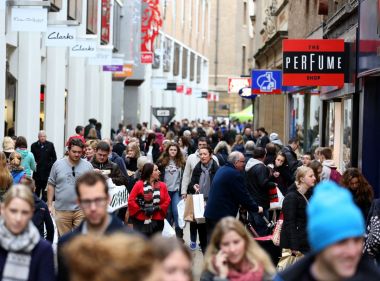The pull of Primark: are we ignoring the dark side of fast fashion?

Bracing yourself before entering the chaotic isles of Primark, overflowing with cheap and cheerful garments, is a feeling that many of us will be familiar with. The high street store, which has 161 branches across the UK, has become a staple fixture in wardrobes up and down the country, and is now set to open its first US store in Boston, Massachusetts next year.
With tops selling for as little as £1.50, and summer dresses for just £5, it's no wonder that Primark has become so popular with bargain-hunting Brits, but just who is paying the real price for our insatiable appetite?
An unsuspecting shopper in Cardiff found a nasty surprise when she inspected one of her purchases more carefully – a hand-stitched label reading "Forced to work exhausting hours" was sewn alongside the usual washing instructions in her £10 Primark top.
25-year-old Rebecca Gallagher told the South Wales Evening Post that she immediately telephoned the retail giant, famous for being implicated in the collapse of a Bangladeshi clothing factory which killed over 1,100 people in 2013, but was "put on hold for 15 minutes before being cut off".
"To be honest I've never really thought much about how the clothes are made, but this really made me think about how we get our cheap fashion," she told the newspaper.
"I dread to think that my summer top may be made by some exhausted person toiling away for hours in some sweatshop abroad.
"It makes me think that it was a cry for help – to let us people in Britain know what is going on...You hear all sorts of stories about people working in sweatshops abroad – it made me feel so guilty that I can never wear that dress again," she added.
A spokesperson for Primark is quoted as saying Ms Gallagher's is an isolated incident, but assured that it would be "investigate[d]" to ensure "whether there are issues which need to be looked into".
The story has since been picked up by the national media, and hundreds of shoppers have expressed their distaste. But can anyone really be surprised by the suggestion that Primark, among other high street giants, may facilitate poor working conditions?
Ruth Valerio, Churches and Theology Director for A Rocha UK and Fairtrade activist, thinks not. "There's been so much talk recently, and over the years, about fast fashion and the conditions of people who make the things we wear," she says.
"The problem is that our attention span is so short. We know it's terrible, but we forget about it so easily because it's so distanced from us – we're not buying directly from someone who we can see is in awful conditions, but instead we're buying it in a nice, brightly lit shop – and so it's hard to remember that there's a connection."
Valerio suggests that it's difficult to move "from awareness into action", but that Christians in particular have a responsibility to buy fairly and support movements which encourage better working conditions.
"The Bible is shot through from start to finish with how we should be concerned for other people, particularly people who are poorer than us and more disadvantaged than we are," she notes.
"The themes of love, justice and compassion run like a golden thread all through the biblical narrative, and we can't ignore that. For me, it's an absolutely essential part of what it means to be a follower of Jesus, and part of the people of God."
She suggests that we buy fewer clothes, and invest in more expensive but fairly-traded and ethical items. "The right question to ask is: 'Why are our clothes so cheap?'" she says. "When you start looking behind the label, you realise why that is."
Valerio says charity shops are a great place to grab a bargain without supporting the fast fashion industry, while also highlighting the importance of Fairtrade jewellery and encouraging shoppers to "do their homework" behind High street brands.
But it doesn't just stop at shopping differently. "Engage with campaigns – use your voice to make a difference," she urges.
"It's always good to ask shops about their sourcing policy, and if you do decide you're not going to shop in a certain place anymore, drop them a quick note online to tell them why. Those actions will have a bigger impact than just not buying the clothes."
"I should also add that I'm completely hypocritical – I don't do this 100 per cent, it's very difficult," she points out.
"So let's extend grace to one another. The main thing is to be trying – if there's one item we decide to buy differently, then we've made a difference. If there's one email we send to customer service, then that's done something that wouldn't have happened otherwise.
"Don't look and say 'I can't do this 100 per cent so I can't do anything – I'm paralysed'. Just do one thing, it's better than not doing anything at all."
Global advocacy organisation Stop the Traffik is urging consumers to pay more attention to where their clothes are made, and to call for an end to slavery in the fashion industry. To find out more, click here.











